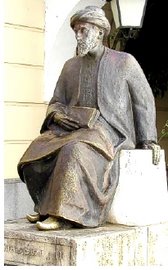The central idea of Judaism involves a commitment by the Jewish people to a single, omnipotent, incorporeal God, who is the creator and ruler of the universe and the source of a moral law for humanity. The idea of God as the creator of the universe opens the Biblical narrative Bereshit (“In the Beginning”) in the Book of Genesis.
The declaration of this belief appears throughout the Jewish source texts, including in the key prayer known as the Shema. The Shema, a recitation of Deuteronomy 6: 4-9, is a central feature of every synagogue service. It is also recited daily upon waking and on significant occasions such as approaching death. The Shema (whose name means “Listen/Hear”) begins:
“Hear, O Israel, the Lord is our God. The Lord is One.
Blessed be his name, whose glorious kingdom is for ever and ever.
And you shall love the Lord your God with all your heart and with all your soul and with all your might.”
The concept of a moral law prescribed by God is one of the principal subjects of the Torah, the first five books of the Bible. The concept of the Creator’s moral law suffuses the Tanach, which comprises the Torah, the Prophets and the Writings. (See Core Ethical Teachings of Judaism.)

